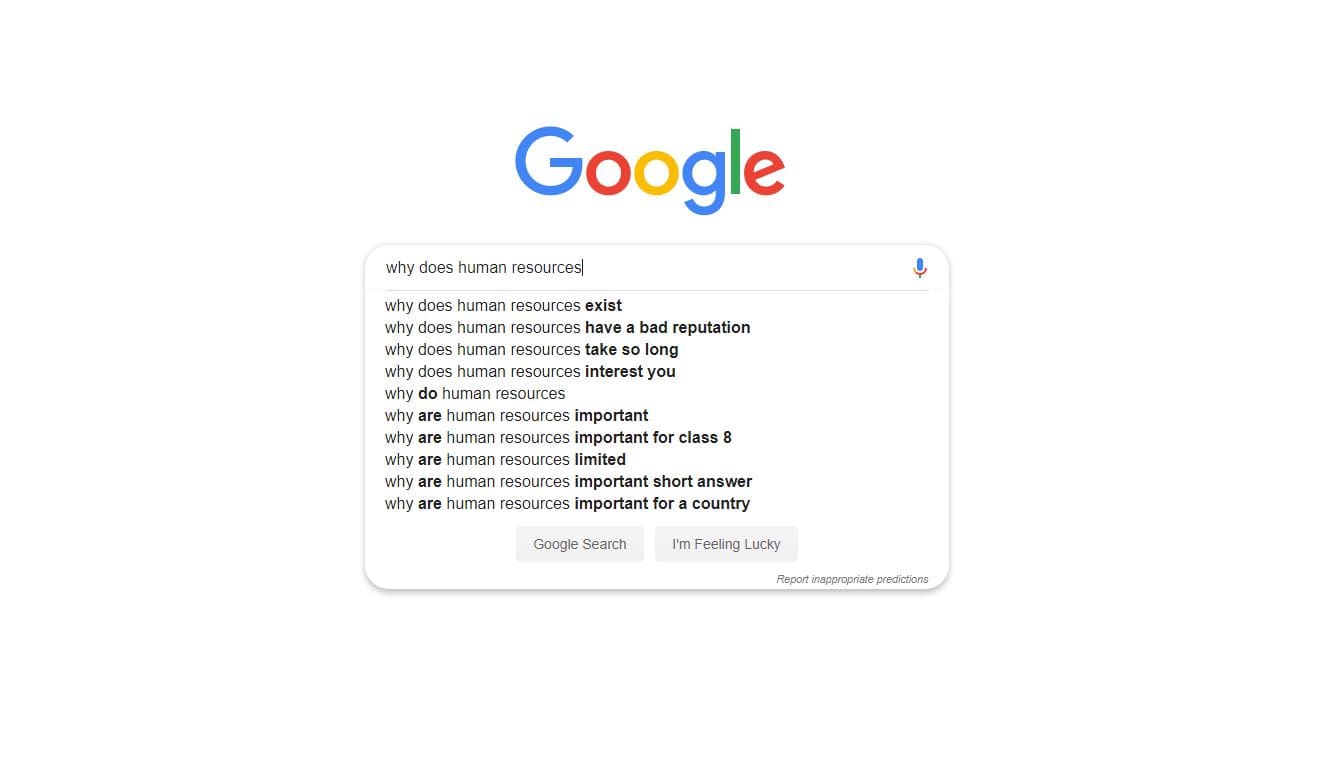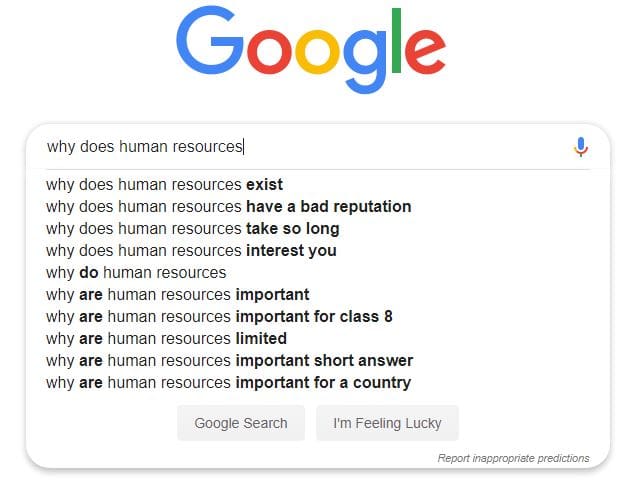
Google Autocomplete Questions: Why Does HR Have a Bad Reputation?
April 03, 2019 Written by Josh Hrala

Compare Providers
Download our outplacement comparison sheet
Request Pricing
Compare our rates to other providers
If you ever want to know what questions the world is asking at any given moment, you simply have to head on over to Google and type in ‘how does’ or ‘why is.’ In less than a second, Google will autocomplete the question based on what it thinks you want to see.
This can be a pretty funny experience. For example, sometimes Google’s autocomplete will come up with pure gibberish. More often than not, when typing in a simple question like ‘why is,’ Google pulls questions pertaining to simple facts of life, such as ‘why is the sky blue?’ or ‘why is the ocean salty.’ Here’s what it says when you type ‘what can:’
The true power, though, lies in refining the search a bit more by simply adding another word. This allows you to take a sort of poll, looking into what the general public is asking about specific things.
Noticing this, we’ve decided to take to Google and answer some of the most asked HR questions, allowing the search engine to autocomplete the questions for us.
In this new series, we’ll take a look at an interesting question posed by autocomplete, starting by with ‘why’ and working our way through the five other ‘jouralistic’ questions, such as who, what, where, when, and how.
Let’s jump right in with ‘why.’
Autocomplete Suggestion: Why Does Human Resources Have a Bad Reputation?
As you can see from the results, some of these questions are very basic, such as ‘why does human resources exist.’ However, the second question is quite interesting.
‘Why does human resources have a bad reputation?’ This is a great question because, as anyone who has ever watched a movie, read a comic, or really experienced anything in pop culture knows: HR is a stuffy department where people are sent to be punished and/or fired. HR is filled with a bunch of bureaucratic paper-pushers who follow rules to the letter and are generally no fun to be around.
This couldn’t be farther from the truth.
Maybe, at one time many years ago, HR was filled with corporate henchman, but those days – if they ever existed at all – are gone.
So, where did this all come from? To answer that, let’s see what people are saying about HR and what their common complaints are. After all, this might shed some light on why HR has such a bad rep.
Common Complaints About HR
In an article for Forbes, Liz Ryan came up with 10 different things that employees believe about HR. They can be summarized as this:
- HR is only on the side of the employer
- HR wants to punish employees
- HR isn’t to be trusted
- HR doesn’t act when they really need to (an abusive manager, for example)
- HR generally doesn’t know the inner workings of the business outside of their department
- HR is too involved with policy and creates more roadblocks – instead of removing them
- HR loves office politics
- HR is too obsessed with policy and training instead of focusing on important things like culture, trust, etc.
- HR doesn’t actually see the human side of things at all
- HR corrodes culture instead of heightening it
Oof. That’s a heavy list of complaints. A thread seems to run through them, though: many folks believe that HR is their enemy. That HR is somehow out to get them in trouble. In other words, HR is othered and, therefore, a threat and enemy.
“We all have the tendency to divide up the world into two groups: Us and Them. It’s easy to make HR people the enemy. You can take the opposite view and assume that the HR folks in your shop are doing their best,” reports Ryan.
“Remember that hostility and fear are two sides of the same coin.”
While her list isn’t definitive and would likely change from organization to organization, it’s important to consider all of these complaints, especially if you hope to change the opinions of your staff members. (Hopefully, your staff doesn’t feel this way because this view is pretty antiquated right off the bat).
So Where Did This Mentality Come From?
This is a harder question to answer. Most likely, given that HR has to handle a bunch of different things, such as onboarding, hiring, policy making (and enforcing), cultural programs, and offboarding, many employees only single out the negative experiences they’ve had, or have heard of, when dealing with HR.
For example, say that you work for a company that has a great culture, is transparent in their practices, and is – generally – a good place to work. Then, an economic shift happens, sending the business into financial chaos. Say, even, that that downturn was caused by the choice of an executive who pivoted to a new product that simply doesn’t sell.
If this happens, guess who you will likely get a letter from and a meeting with? HR. In these tense moments, when layoffs or RIFs happen, HR is likely the last step of the offboarding procedure and, therefore, the bad guys.
No one seems to put blame on the CEO for making a bad move or the economy for tanking. No, the sole decision and reason for a person’s termination is the HR department – even though that very same department was the sole thing that made the company a great place to work to begin with.
These moments definitely color the way employees feel about HR. And, in the past, viewing HR as the enemy sort of made sense. This would be back in the days of paper-pushing and policy enforcement.
However, those days are the past now. HR’s role is continuously changing, but really they seem to follow the trends of business.
HR’s Performance Depends on Corporate Culture Set at the Top
Business changes over time. Back, say, 40 years ago, employees were expected to clock in on time, be at their desk all day, take the required time for lunch, and be out of the door at 5 pm (or stay late). It was rigid and unforgiving.
These rules were set by the business’s leadership team, which for far too long lacked representation by an HR official (even today, HR has a tough time ‘getting a seat at the table’).
So, if an employee was late, if they broke one of the million rules, HR had to do the disciplining, the writing up. If nothing changed, HR had to do the firing.
Over the years, things changed – thankfully for the better – but HR’s reputation remained the same.
In today’s world, HR is focused on improving corporate culture, retaining employees, and making sure everything that has to do with the employment process is smooth and easy, allowing employees to perform their jobs in ways that make sense.
This change in HR has been heavily influenced by the general changing of the face of business across the globe. Workplaces have become more engaging and flexible in an effort to make jobs more rewarding. It’s less about strict rule following (though legal issues, misconduct, and things of that nature will always be important) and more about culture.
Look inside any HR publication today and you’ll find countless articles about the importance of engagement and work-life balance. These issues have seemingly cropped up specifically because the old way was horrible. And HR is leading the charge to make these new changes possible.
The Takeaways: ‘Why Does HR Have a Bad Reputation?’
HR’s reputation stems from a time when business operated differently. Based on Ryan’s findings in her article for Forbes, we can see that many of the complaints about HR have to do with the department’s old-school, henchmen-like nature that may have existed a long time ago, but doesn’t any longer.
Now, HR is more aligned with what workers want. In a way, the human has been brought back to human resources with the best companies in today’s world leaning heavily on how HR can improve culture, morale, engagement, and retention.
How modern HR can get out from underneath the weight of their old reputation is an interesting question – one that cannot be easily answered. However, it stands to reason that, if HR keeps doing what it’s doing now, the reputation will change organically over the next generation.
Fingers crossed.
In need of outplacement assistance?
At Careerminds, we care about people first. That’s why we offer personalized talent management solutions for every level at lower costs, globally.






